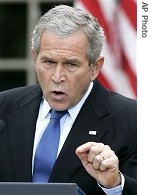-
(单词翻译:双击或拖选)
By Paula Wolfson
White House
11 October 2006
President Bush is calling for strong international action in response to North Korea's nuclear-test claim. Mr. Bush made clear he favors a forceful diplomatic message to Pyongyang.
-----
 George W. Bush |
||
"In response to North Korea's actions we are working with partners in the region and in the United Nations Security Council to ensure there are serious repercussions1 for the regime in Pyongyang," Mr. Bush says.
The president says he envisions a Security Council resolution that will require North Korea to live up to its international commitments to dismantle2 its nuclear programs. He says the resolution should also include a series of measures to prevent North Korea from exporting nuclear or missile technologies, and to block related financial transactions.
The president makes clear he wants to rely on diplomacy3, saying the United States has no plans to attack North Korea.
But he stresses America will work with its allies in the region to improve their defense4 capability5.
"So in response to North Korea's provocation6 we will increase defense cooperation with our allies, including cooperation on ballistic missile defense to protect against North Korean aggression7, and cooperation to prevent North Korea from exporting nuclear and missile technologies," Mr. Bush says.
During a news conference in the White House Rose Garden, President Bush rejected the suggestion that his North Korea policy has failed. He said the world is now speaking as one on the need to prevent Pyongyang from developing nuclear weapons.
"China is now an integral partner in helping8 North Korea understand, and it is not just the United States speaking to them," Mr. Bush says. "And it is an important sign to North Korea that South Korea, a country which obviously is deeply concerned about North Korean activities, South Korea is a partner."
Just moments before Mr. Bush spoke9 to reporters, U.N. Secretary General Kofi Annan called for the United States to engage in one-on-one talks with the North Koreans. He said such dialogue would help resolve the current nuclear standoff.
"I have always argued that we should talk to parties whose behavior we want to change, whose behavior we want to influence," Mr. Annan says. "From that point of view, I believe that we should -- the U.S. and North Korea should talk."
But President Bush made clear he is not interested in bilateral10 negotiations11 with North Korea. He said the United States tried that once before, and that Pyongyang walked away from an agreement reached in 1994.
"Bilateral negotiations did not work," Mr. Bush says. "I appreciate the efforts of previous administrations, but it just did not work. And therefore I thought it was important to change how we approach the problem so we could solve it diplomatically."
The president said the best way to deal with both North Korea and Iran is multilaterally, with the United States working in concert with other countries to put pressure on Pyongyang and Tehran. When asked if he could accept a nuclear North Korea, Mr. Bush responded with just one word: "No".
 收听单词发音
收听单词发音
1
repercussions

|
|
| n.后果,反响( repercussion的名词复数 );余波 | |
参考例句: |
|
|
|
2
dismantle

|
|
| vt.拆开,拆卸;废除,取消 | |
参考例句: |
|
|
|
3
diplomacy

|
|
| n.外交;外交手腕,交际手腕 | |
参考例句: |
|
|
|
4
defense

|
|
| n.防御,保卫;[pl.]防务工事;辩护,答辩 | |
参考例句: |
|
|
|
5
capability

|
|
| n.能力;才能;(pl)可发展的能力或特性等 | |
参考例句: |
|
|
|
6
provocation

|
|
| n.激怒,刺激,挑拨,挑衅的事物,激怒的原因 | |
参考例句: |
|
|
|
7
aggression

|
|
| n.进攻,侵略,侵犯,侵害 | |
参考例句: |
|
|
|
8
helping

|
|
| n.食物的一份&adj.帮助人的,辅助的 | |
参考例句: |
|
|
|
9
spoke

|
|
| n.(车轮的)辐条;轮辐;破坏某人的计划;阻挠某人的行动 v.讲,谈(speak的过去式);说;演说;从某种观点来说 | |
参考例句: |
|
|
|
10
bilateral

|
|
| adj.双方的,两边的,两侧的 | |
参考例句: |
|
|
|
11
negotiations

|
|
| 协商( negotiation的名词复数 ); 谈判; 完成(难事); 通过 | |
参考例句: |
|
|
|















